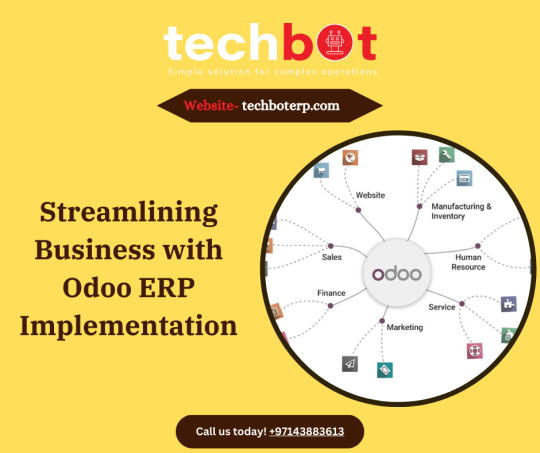#odoo erp implementation
Text
Implementing Odoo Accounting to Meet UAE FTA Compliance

Implementing Odoo Accounting provides significant capabilities in managing a range of accounting operations in a more advanced manner than standard cloud-based accounting systems. These include multi-company support, automation of intercompany transactions, advanced reconciliation, budget management, and reporting. Therefore, as an all-in-one platform with this accounting functionality, Odoo offers a robust and cost-effective solution for enterprises.
Since the introduction of VAT Registration in 2018, demands on accounting systems to meet compliance obligations under the UAE Executive Regulations are specifically detailed under Requirements Document for Tax Accounting Software specification.
To Read More About Implementing Odoo Accounting click the link above
2 notes
·
View notes
Text
Implementing Odoo Accounting to Meet UAE FTA Compliance

Implementing Odoo Accounting provides significant capabilities in managing a range of accounting operations in a more advanced manner than standard cloud-based accounting systems. These include multi-company support, automation of intercompany transactions, advanced reconciliation, budget management, and reporting. Therefore, as an all-in-one platform with this accounting functionality, Odoo offers a robust and cost-effective solution for enterprises.
Since the introduction of VAT Registration in 2018, demands on accounting systems to meet compliance obligations under the UAE Executive Regulations are specifically detailed under Requirements Document for Tax Accounting Software specification.
To Read More About Implementing Odoo Accounting click the link above
2 notes
·
View notes
Text
Odoo Implementation Services | Odoo Customisation
Improve the usability of your Odoo platform with our expert services, which include integration and modification to match your particular business needs.
In today's hard-pressed business environment, small-to-medium enterprises (SMEs) face several challenges when it comes to optimizing their operations while keeping costs in check. To overcome these challenges, it is essential to have effective ERP systems in place that are conducive to streamlining complex business processes.
Odoo implementation services, odoo erp implementation, odoo development company

0 notes
Text
Discover the key factors that influence the cost of implementing an ERP system. From setup to customization, learn how to plan your budget effectively and maximize your return on investment.
0 notes
Text
Maximizing Business Efficiency with Odoo ERP Implementation Service
In today’s competitive business environment, staying ahead of the curve requires more than just traditional management practices. Companies need agile, scalable, and integrated systems to streamline their operations. This is where an Odoo ERP implementation service becomes indispensable.
Odoo implementation is not just about setting up software; it's about aligning your business processes with a solution that can optimize every aspect of your operations, from inventory management to customer relations. An Odoo implementation service offers a customizable platform that integrates various business functions into one cohesive system, ensuring that your data is centralized and accessible in real time.
Why Choose Odoo ERP Implementation Service?
The Odoo ERP implementation service is designed to cater to the unique needs of businesses, regardless of their size or industry. It provides an all-in-one solution that can be tailored to fit specific requirements. With Odoo, you can start with the most critical modules and scale up as your business grows. This flexibility makes Odoo implementation an ideal choice for businesses looking to enhance efficiency, reduce costs, and improve decision-making.
One of the significant advantages of Odoo implementation is its modular approach. This means that you can implement only the modules you need, ensuring a cost-effective solution without compromising on functionality. Whether you need help with accounting, human resources, or sales management, an Odoo ERP implementation service can be customized to meet your exact needs.
Steps Involved in Odoo Implementation
1. Needs Assessment: The process begins with a thorough analysis of your business needs to determine which modules will bring the most value.
2. Customization: Based on the needs assessment, the Odoo implementation service will customize the ERP system to fit your business processes.
3. Training and Support: Post-implementation, you receive comprehensive training to ensure your team is well-versed in using the system effectively.
4. Continuous Improvement: Odoo’s flexibility allows for continuous adjustments and improvements, ensuring that your system evolves with your business.
By choosing an Odoo ERP implementation service, you're not just adopting software; you're investing in a tool that will grow and adapt with your business. Whether you're a small startup or an established enterprise, Odoo implementation can provide the foundation for sustained success.
Implement Odoo today and take the first step toward transforming your business operations.
1 note
·
View note
Text
Odoo Implementation Services | Odoo Customisation
Improve the usability of your Odoo platform with our expert services, which include integration and modification to match your particular business needs.
Oodo implementation services, odoo erp implementation, odoo development company
Visit to learn more: https://www.oodles.com/odoo-implementation/2172802
0 notes
Text
Customizing Odoo ERP to Meet Your Business Needs

Introduction to Odoo ERP Customization
Businesses need robust and flexible ERP systems that can adjust to their specific processes and workflows in the fast-paced commercial world of today. One unique feature of Odoo ERP is its outstanding level of customization, which enables it to meet a variety of corporate needs. Because of its modular design, Odoo enables companies to add or change functionality to suit their needs and guarantee a customized fit. This article will discuss how working with an Odoo implementation partner can improve your Odoo ERP software development and implementation process, as well as the customization choices accessible in Odoo ERP.
Understanding Odoo ERP Customization
Numerous modules covering different business operations including sales, inventory, accounting, HR, and more are available with Odoo ERP. It's simple to create and modify these modules so that they work with your business procedures. Odoo customization can take many forms, from straightforward changes to module settings to more intricate projects like adding new modules or connecting external apps. Because of its adaptability, Odoo ERP is the best option for companies trying to increase productivity and optimize processes.
Key Customization Options in Odoo ERP
Module Configuration: Module configuration is among the most basic ways to customize Odoo. Every module has some default options that you can change to suit your needs as a business. For instance, you can set up customer segmentation, discount schemes, and pricing regulations in the sales module to complement your sales approach.
Workflow Automation: To increase productivity and decrease manual involvement, you can automate a variety of workflows using Odoo. Workflows can be tailored to do particular tasks in response to pre-established criteria. For example, you can automate the purchase order approval procedure or schedule automated reminders for past-due payments.
Custom Dashboards and Reports: Every company has different reporting requirements. With Odoo, you can design personalized dashboards and reports that offer insightful analysis of your business processes. Reports can have their layout, data fields, and graphics altered to suit your unique needs.
New Module Development: Odoo supports the creation of new modules in case the current ones don't adequately meet your demands. This entails developing unique apps that work in unison with the main Odoo system. You can create and implement bespoke modules that are suited to your company processes with the assistance of an Odoo implementation partner with experience in Odoo ERP software development.
Third-Party Integrations: Odoo's capabilities can be increased by integrating it with a number of different third-party programs. Odoo's open architecture makes it feasible to interact with other business tools, payment gateways, and e-commerce platforms. These integrations make sure that every system in your company functions as a whole.
Real-World Examples of Odoo Customization
Customized Odoo ERP solutions have proven beneficial for a multitude of enterprises. For instance, by tailoring the stock module to track product variations and more efficiently manage warehouse locations, a retail company was able to optimize its inventory management process. Stockouts were significantly reduced as a result of this adjustment, and order fulfillment times were expedited.
In another instance, a manufacturing business created a unique module to control its production schedule. Real-time visibility into production capacity and demand was made possible by the module's integration with the current manufacturing and sales modules. The organization was able to cut lead times and enhance its production operations thanks to this customization.
Conclusion
Customizing Odoo ERP to your unique business requirements can completely change the way you run your company, resulting in more productivity, wiser choices, and happier clients. Your Odoo ERP software development and implementation journey will be successful thanks to Odoo's versatility and an experienced Odoo implementation partner. Through the complete utilization of Odoo's customization functionalities, enterprises can attain a customized ERP system that stimulates expansion and creativity.
In conclusion, Odoo ERP offers a wide range of customization possibilities, including the ability to integrate third-party apps, create new modules, and configure existing ones. You may successfully navigate these choices and put in place a solution that precisely matches your business needs by working with a certified Odoo partner.
#Odoo#Odoo ERP#Odoo ERP Implementation#odoo erp software#odoo services#odooimplementation#odoo support#Business Needs#ahextechnologies
0 notes
Text
Odoo Implementation for Manufacturing Industry - PPTS
PPTS, one of the top Odoo gold partner in India offers Odoo implementation service through which you can streamline and automate your business efficiently.
#Odoo ERP Implementation#Odoo Partner in US#Odoo Implementation#manufacturing#manufacturing industry
0 notes
Text

Techbot ERP offers seamless Odoo ERP implementation services, ensuring a smooth transition for businesses. From initial planning to final execution, our experts customize Odoo to fit your unique needs. With comprehensive training and ongoing support, we empower your team to maximize productivity and efficiency. Experience the benefits of a fully integrated ERP system tailored to your operations, from accounting to inventory management. Choose Techbot ERP for a streamlined business experience.
0 notes
Text
Master Odoo ERP With Successful User Training and Adoption

Odoo is flexible, open-source enterprise resource planning (ERP) software that has become popular across small and large organizations for its component-based architecture and broad range of business applications. However, like any potent tool, realizing the full potential of Odoo requires mastering the software and ensuring successful adoption across the organization. It is where strategic user training and shift management come in.
Executing a new ERP system brings important changes to business processes and day-to-day workflows. Without proper training and support, employees may fail to fully exploit or even resist the new system. User adoption is crucial to maximizing the return on investment from Odoo. Through customized training plans and change management strategies, organizations can delegate their staff to fully benefit Odoo, streamline operations, and make smarter, data-driven decisions.
With the right training and adoption technique, you can ensure your Odoo implementation is an achievement and unlocks concrete improvements in productivity, collaboration, and analytics across business areas. The strategies covered will set you on the path to fully mastering Odoo and transforming it into a key, reasonable advantage for your organization.
What is Odoo ERP?
Odoo is an open-source, Python-based enterprise resource planning software suite with cohesive applications for business requirements like CRM, accounting, inventory, direct sales, project management, and manufacturing. Odoo provides an integrated solution to rationalize business processes under one user-friendly interface at a lower total cost of ownership.
Why are user training and adoption important?
User training and adoption are critical to the positive results of any new software implementation, especially an inclusive system like an ERP. Here are some key reasons why user training and adoption are important for Odoo ERP:
Ensures users completely understand the new workflows and processes in Odoo to use the system effectively. Lack of training leads to under-utilization.
It enables users to learn tips and shortcuts to work effectively in Odoo, saving time and effort.
It mitigates mistakes and errors as users get hands-on practice in a test setting.
This causes adoption across the organization as users get comfortable with the new system. Change management is promoted.
It enables users to provide substantial feedback to improve arrangements and customize Odoo.
It helps managers understand gaps in user knowledge to improve training material.
Builds user potential to leverage new features and updates quickly upon release.
Maximizes ROI from the Odoo investment as productivity and operations improve.
Minimizes reliance on IT support as users become self-sufficient for regular usage.
Strategies to enable Odoo ERP training and adoption
Commissioning Odoo ERP training and adoption requires a combination of strategic planning, effective communication, and continuous support. Here are some strategies to boost the training and adoption of Odoo ERP:
Gap Analyses: Performing a thorough needs analysis is the basis for a successful Odoo ERP implementation. It implies understanding the unique demands of your organization, the pain points in present processes, and the precise goals you aim to achieve with Odoo. By determining these needs, you can adapt the ERP system to fit effortlessly into your workflows, ensuring that the training program aligns with the actual disputes and objectives of your organization.
Create a Training Plan: Developing a thorough training plan is crucial to preparing users for the acceptance of Odoo. The plan should include a variety of learning methods, including instructor-led sessions, online courses, and hands-on workshops. Customizing the training program for different user roles guarantees that each team member receives relevant and targeted instruction. A carefully planned scheme not only facilitates effective learning but also enhances the likelihood of successful adoption by addressing the diverse learning preferences of users.
User Involvement: Engaging end-users in the initial stages of the ERP implementation process is crucial for fostering a sense of possession and buy-in. Creating user councils or involving key users in decision-making makes sure that the Odoo system aligns with their daily tasks and problems. This collaborative approach not only provides valuable foresight but also makes users feel invested in the success of the ERP solution, leading to increased engagement and commitment.
Train-the-Trainer Approach: The train-the-trainer approach involves identifying and training internal super-users or champions who will act as domestic experts. These individuals play a pivotal role in assisting their peers during and after the training sessions. By permitting internal trainers, you create a support system within the organization. This approach also enables a more personalized and relatable learning experience, as the trainers understand the specific needs and nuances of their colleagues.
Documentation and Resources: Providing complete documentation and resources is vital for ongoing support and self-learning. User manuals, FAQs, and video tutorials should be easily available to users at all times. These resources act as quick references for problem-solving and can help users guide the system independently. Clear and precise documentation ensures that users have the necessary tools to reinforce their learning and address challenges as they arise.
Continuous Learning: Implementing a constant learning model is vital for keeping users informed about updates, new features, and best procedures related to Odoo. Frequent refresher courses and advanced training sessions contribute to skill improvement and ensure that users stay proficient in utilizing the full potential of the ERP system. This approach advocates a culture of continuous improvement and adaptability within the organization.
Feedback Mechanism: Demonstrating a feedback mechanism is crucial for understanding user experiences and addressing any difficulties promptly. Regular feedback sessions, surveys, or dedicated channels for user input create a dialogue between users and the implementation team. This iterative feedback loop allows for continuous improvement of the training program, the ERP system itself, and the overall user experience.
Communication and Change Management: Clear communication about the benefits of Odoo and the motives for the ERP implementation is fundamental for overcoming resistance and ensuring a smooth transition. A coherent change management plan addresses issues, manages expectations, and underlines the positive impact of the ERP system on individual and corporate efficiency. Effective communication builds trust and a shared awareness of the goals, fostering a positive attitude toward the change within the organization.
Effective Odoo Training from Entrivis
Looking to get the most out of your Odoo ERP investment? Entrivis provides top-rated Odoo training tailored to your needs. Their experts examine roles and demands to develop custom procedures. Training is delivered through interactive workshops in simulated Odoo settings for hands-on learning. Entrivis groups trainees by job function for relevant training and offers constant support. Their end-to-end methodology, coupled with real Odoo expertise, ensures your users rapidly adopt Odoo for maximum productivity and ROI. Partner with Entrivis Tech for the right knowledge transfer to drive Odoo's success.
0 notes
Text
Odoo in the Cloud: Benefits and Considerations for ERP Success
In the ever-evolving landscape of enterprise resource planning (ERP) solutions, Odoo stands out as a versatile and comprehensive system that adapts to various business needs. As companies continue to modernise their operations, the integration of Odoo ERP into cloud-based environments has become a pivotal choice. This shift brings forth a multitude of benefits but also requires a careful consideration of several factors to ensure a seamless transition and optimised performance.
Understanding Odoo ERP in the Cloud
Embracing the cloud for Odoo ERP deployment offers businesses unparalleled flexibility and scalability. By hosting Odoo in the cloud, companies leverage remote servers maintained by third-party providers, enabling access to the ERP system via the internet from any location, at any time. This approach eliminates the need for on-premises hardware and the associated maintenance costs, making it an attractive option for businesses of all sizes.

Benefits of Odoo ERP in the Cloud
1. Accessibility and Flexibility: Cloud-based Odoo ERP grants users the freedom to access crucial business data and functionalities from any device with internet connectivity. This accessibility fosters collaboration among teams spread across different geographical locations, promoting efficiency and agility.
2. Scalability: Cloud hosting allows seamless scalability of Odoo ERP. As businesses grow or experience fluctuating demands, they can easily adjust their resources and storage requirements without disruptions, ensuring a smooth operational flow.
3. Cost-Efficiency: Adopting Odoo ERP in the cloud eliminates the need for substantial upfront investments in infrastructure. Companies pay for the resources they use, enabling better cost control and allocation of funds to other strategic areas of the business.
4. Enhanced Security Measures: Reputable cloud service providers implement robust security protocols, offering advanced data encryption, regular backups, and compliance certifications. This bolsters the overall security of Odoo ERP systems, often surpassing the security measures implemented on-premises.
5. Automatic Updates and Maintenance: Cloud-based Odoo ERP systems receive automatic updates and maintenance, ensuring that businesses are consistently leveraging the latest features, security patches, and improvements without manual intervention.
Considerations for Odoo ERP in the Cloud
While the benefits of migrating Odoo ERP to the cloud are evident, several considerations merit attention:
1. Data Security and Compliance: Businesses must evaluate the cloud provider's security measures and ensure they comply with industry regulations relevant to their operations. This includes data encryption, compliance certifications (such as GDPR or HIPAA), and the provider's data handling practices.
2. Performance and Reliability: Assess the reliability and performance history of the cloud provider. Downtime and latency issues can disrupt operations, so it's crucial to choose a provider with a strong track record in uptime and consistent performance.
3. Integration and Customisation: Ensure that the chosen cloud environment supports seamless integration with other business applications and allows customisation of Odoo ERP to match specific workflows and requirements.
4. Cost Management: While cloud-based solutions offer cost savings, businesses should monitor and optimise resource usage to prevent unexpected spikes in expenses. Regularly evaluating resource allocation helps in optimising costs.
Deploying Odoo ERP in the cloud unlocks a realm of possibilities for businesses seeking efficient, scalable, and accessible ERP solutions. The advantages of enhanced accessibility, scalability, cost-efficiency, and robust security measures outweigh the considerations with proper planning and diligent selection of a reliable cloud provider.
By embracing Odoo ERP in the cloud, companies can streamline their operations, empower their teams with accessible and powerful tools, and stay competitive in an ever-evolving business landscape. However, a thoughtful approach to security, reliability, integration, and cost management is essential for a successful and sustainable migration to the cloud.
0 notes
Text
#business#technology#business services#odoo consulting services#odoo customization#odoo erp implementation#odoo erp support#erp odoo implementation partner#wordpress odoo erp integration#odoo ERP integrati#Odoo ERP Third Party App Integration#offshore odoo development services#Odoo ERP Migration Services
0 notes
Text
Streamline Your Business with Odoo ERP Implementation: Partner with Odoo Experts in Spain
Odoo experts in Spain possess extensive knowledge and expertise in implementing Odoo ERP systems. They have a deep understanding of the Odoo platform's capabilities, modules, and features, enabling them to guide you through the implementation process with precision. Their proficiency ensures that your Odoo ERP solution is optimised to meet your business requirements and industry-specific needs.
#odoo erp implementation#erp implementation#odoo erp solution#odoo experts#odoo experts in spain#odoo erp#odoo#erp
0 notes
Text
Odoo ERP Implementation Company | ERP Implementation & Support - Caret IT
Get Odoo implemented by best Odoo Implementation Company, CaretIT, certified Odoo Silver Partner. Get a FREE quote for Odoo ERP & Software Development.
#odoo implementation service#odoo implementation#odoo erp implementation#odoo implementation company
0 notes
Text
Odoo ERP Implementation

The secret to a successful organization is correctly implementing ERP, and this must be done in a timely and cost-effective manner. Without a doubt, the implementation partner you select for your company will be the deciding factor in the success of your ERP deployment. The ERP software Odoo is incredibly user-friendly, versatile, and intuitive. Also, your business will start off with the appropriate processes thanks to the deployment of Odoo. Additionally, after you select the ideal Odoo installation partner, they will guarantee the expansion of your company by successfully integrating the Odoo ERP.
The Odoo implementation process typically involves the following steps:
Requirements gathering: Understand the business requirements and objectives of the organization.
Planning: Create a project plan and schedule, including timelines and milestones.
Installation and configuration: Install the Odoo software and configure it to meet the organization's specific needs.
Customization: Develop custom modules and apps to extend the functionality of the software to meet the organization's unique requirements.
Data migration: Import existing data from legacy systems into the new Odoo system.
Testing: Test the system to ensure it is working as expected and identify and resolve any issues.
Training: Train users on how to use the new system and provide ongoing support.
Deployment: Go live with the new system and provide ongoing support and maintenance.
The implementation of the Odoo ERP modules is a step in the Odoo Implementation Process. Sales, buy, accounting, inventory, CRM, eCommerce, invoicing, manufacturing, staff management, and many other company management modules are available with Odoo and can be used in a variety of business sectors.
If done without the aid of Odoo experts, implementing Odoo might be challenging. This means that in order to successfully integrate Odoo, you will require assistance from specialists. Simply expressed, the success of the firm depends on correctly integrating ERP. Also, it is evident that choosing the proper Odoo partner is the only factor that will determine the implementation's success. Further, Implementing Odoo ERP can assist a company in a number of ways, including:
Efficiency gain: Organizations can streamline their procedures and lower manual errors by combining many business processes into a single system.
Better visibility: Organizations can acquire a better understanding of their operations and make better business decisions with the help of real-time data and reporting capabilities.
Cost savings: By reducing the requirement for various software systems, firms with an ERP system in place can save money.
Scalability: Odoo is a highly adaptable platform that is simple to scale in order to match the organization's changing needs.
Automation: Automating repetitive operations like accounting, inventory control, and invoicing, can save time and increase accuracy.
Better customer service: Organizations are able to offer better and more effective customer service when all customer information is in one location.
Collaboration improves: When all employees use the same system, it facilitates the sharing of information and collaboration on projects.
Improved Security: Odoo provides a stronger security model that can assist enterprises in protecting sensitive data.
The use of Odoo guarantees that you may manage your company activities more easily and productively. Furthermore, you will experience enormous business growth as a result of improved and faultless business processes. O2b Technologies often employs an agile methodology to provide clients with the most value possible. Also, Odoo consider using agile technique because it proves more efficient in carrying out customized operations. Moreover, it follows that if the client project includes customization requirements, this approach offers customized sprints that help us to meet all of the customer's expectations.
0 notes